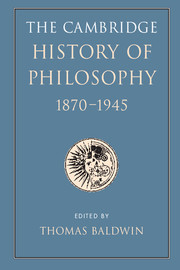Book contents
- Frontmatter
- Contents
- List of contributors
- Introduction
- I 1870–1914
- 1 Positivism, Idealism, and Pragmatism
- 1 Positivist thought in the nineteenth century
- 2 Neo-Kantianism: the German idealism movement
- 3 Idealism in Britain and the United States
- 4 Idealism in Russia
- 5 Bergson
- 6 Pragmatism
- 2 Psychology and Philosophy
- 3 Logic, mathematics, and judgement
- 4 Philosophy and the new physics
- 5 The idea of social science
- 6 Ethics, politics, and legal theory
- 7 Philosophy of religion and art
- Interlude
- II 1914–1945
- Biobibliographical appendix
- Bibliography
- INDEX
- References
6 - Pragmatism
from 1 - Positivism, Idealism, and Pragmatism
Published online by Cambridge University Press: 28 March 2008
- Frontmatter
- Contents
- List of contributors
- Introduction
- I 1870–1914
- 1 Positivism, Idealism, and Pragmatism
- 1 Positivist thought in the nineteenth century
- 2 Neo-Kantianism: the German idealism movement
- 3 Idealism in Britain and the United States
- 4 Idealism in Russia
- 5 Bergson
- 6 Pragmatism
- 2 Psychology and Philosophy
- 3 Logic, mathematics, and judgement
- 4 Philosophy and the new physics
- 5 The idea of social science
- 6 Ethics, politics, and legal theory
- 7 Philosophy of religion and art
- Interlude
- II 1914–1945
- Biobibliographical appendix
- Bibliography
- INDEX
- References
Summary
INTRODUCTION
Pragmatism entered public debate in 1898, when William James (1842–1910) lectured on ‘Philosophical conceptions and practical results’ to the Philosophical Union at Berkeley. His book Pragmatism: A New Name for some Old Ways of Thinking appeared in 1907, a record of lectures delivered in Cambridge, Massachusetts, a year or two earlier (James 1907). Charles Sanders Peirce (1839–1913) delivered a series of lectures entitled Pragmatism in Harvard in 1903 (Peirce 1934), and spent much of the following decade attempting to distinguish his version of pragmatism from James’s and trying to establish its truth. However, although James’s lecture may have been the first public statement of pragmatism, the philosophical outlook which he presented was already two or three decades old, dating to philosophical discussions in Cambridge in the early 1870s. The roots of James’s pragmatism can be seen in writings from that decade which culminated in his Principles of Psychology (1890); an early classic statement of Peirce’s pragmatism is found in a series of papers entitled Illustrations of the Logic of Science which appeared in the Popular Science Monthly in 1877–78, and James’s readers were further prepared for his pragmatism by works such as The Will to Believe (1897).
Although pragmatism is a distinctively American contribution to philosophy, we should not lose sight of the degree to which both Peirce and James were engaged in debates growing out of European philosophy. Indeed this European connection continued: both Peirce and James identified F. C. S. Schiller in Oxford and Italian thinkers such as Giovanni Papini and Giovanni Vailati as important fellow pragmatists.
- Type
- Chapter
- Information
- The Cambridge History of Philosophy 1870–1945 , pp. 74 - 90Publisher: Cambridge University PressPrint publication year: 2003
References
- 1
- Cited by



